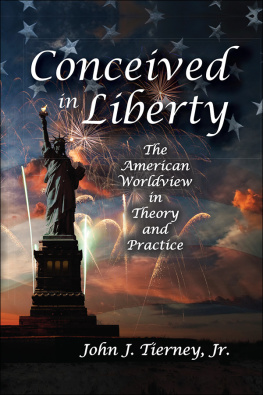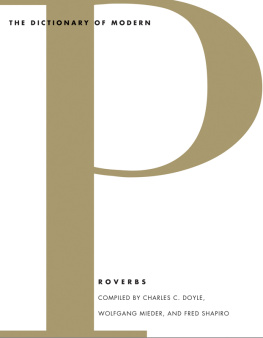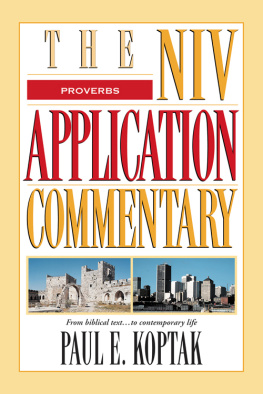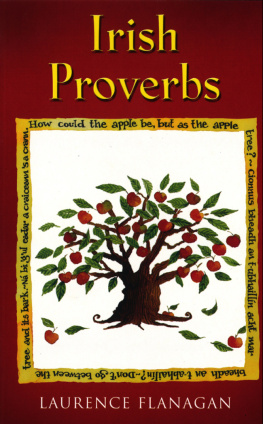This book is a publication of
Indiana University Press
Office of Scholarly Publishing
Herman B Wells Library 350
1320 East 10th Street
Bloomington, Indiana 47405 USA
iupress.indiana.edu
2019 by Wolfgang Mieder
All rights reserved
No part of this book may be reproduced or utilized in any form or by any means, electronic or mechanical, including photocopying and recording, or by any information storage and retrieval system, without permission in writing from the publisher. The paper used in this publication meets the minimum requirements of the American National Standard for Information SciencesPermanence of Paper for Printed Library Materials, ANSI Z39.48-1992.
Manufactured in the United States of America
Library of Congress Cataloging-in-Publication Data
Names: Mieder, Wolfgang, author.
Title: Right makes might : proverbs and the American worldview / Wolfgang Mieder.
Description: Bloomington, Indiana, USA : Indiana University Press, [2019] | Includes bibliographical references and index.
Identifiers: LCCN 2018049711 (print) | LCCN 2018061381 (ebook) | ISBN 9780253040367 (e-book) | ISBN 9780253040343 (cl : alk. paper) | ISBN 9780253040350 (pb : alk. paper)
Subjects: LCSH: United StatesPolitics and governmentMiscellanea. | United StatesPolitics and governmentQuotations, maxims, etc. | Proverbs, AmericanHistory and criticism. | ProverbsPolitical aspectsUnited States. | Political oratoryUnited StatesHistory. | RhetoricPolitical aspectsUnited StatesHistory. | PoliticiansUnited StatesLanguage. | National characteristics, American.
Classification: LCC E183 (ebook) | LCC E183 .M543 2019 (print) | DDC 320.973dc23
LC record available at https://lccn.loc.gov/2018049711
1 2 3 4 5 24 23 22 21 20 19
I T IS WITH MUCH PLEASURE THAT I PRESENT this collection of twelve relatively recent studies under the umbrella title of Right Makes Might: Proverbs and the American Worldview. I am delighted and honored that Indiana University Press is adding this book to its prestigious publications in folklore, giving me the opportunity to make especially those articles that appeared in Germany, Greece, Portugal, Russia, and Spain more accessible. Ten of them stem from the period between 2008 and 2015, with the additional three appearing here for the first time. Together they represent a multifaceted picture of the use and function of proverbs, some of them of unique American vintage, during the history of the United States from its early beginnings to the very modern time. The various chapters are connected by a sociopolitical theme that includes presidential politics, the early struggle for womens rights, the civil rights movement, and more recent attempts to revolutionize national politics. This preoccupation with social and political issues is also present in the final chapters, which take a close look at four proverbs and proverbial expressions, showing that one and the same traditional phrase can take on numerous expressive roles over time.
The proverbial red thread that ties these individual studies together is their concern with the significance of proverbial language as part of the communicative processes in the sociopolitical arena of the United States and beyond. After all, the proverbial rhetoric does not merely take place regionally and nationally but also on the international level, with this country being a major player on the world scene. That traditional proverbs or innovative antiproverbs have their impressive role to play in all of this is what this book is all about. Just one particular pair of proverbs makes this perfectly clear, to wit the aggressive proverb might makes right that has been traced back to 1311 in the English language and its humane antiproverb right makes might that established itself in 1381 but with less frequent use. By the time Abraham Lincoln employed the latter in 1860 in his famed Cooper Union address of February 27, 1860, in New York City, it had taken on an ethical and democratic connotation: Let us have faith that right makes might, and in that faith, let us, to the end, dare to do our duty as we understand it. While this remarkable president did not originate the proverb right makes might, as is so often maintained, it is his use of it in this very sentence that informs my studies and that should be the guidepost for American and global politics.
The introduction: Ruminations on Authentically American Proverbs serves as an overview to the nature of proverbs, with unique emphasis on American proverbs and not on the numerous proverbs of British origin. It is based on intensive diachronic research and treats the origin, the (inter)national distribution, and some German loan translations of truly American proverbs as an example of their global spread. By way of numerous examples, their structures and variants, aspects of antiproverbs, their known or attributed authors, and their origin from songs, films, advertisements, and the mass media in general are discussed. It is also shown that the world of sports, technology, and finance has led to proverb creations, with many of them stressing such themes as success, time, and life. There is also a discussion about values being expressed in these proverbs, something that should be taken cum grano salis, since proverbs as generalizations must not be understood as definite expressions of worldview. And yet, such proverbs as paddle your own canoe, this is a free country, making a way out of no way, freedom is not for sale, and think outside the box are blatantly American. The quintessential American proverb different strokes for different folks, with its earliest recorded reference from 1945, was coined among the African American population and was popularized throughout the country by way of the song Everyday People (1968) by the group Sly and the Family Stone. Without any doubt, this proverb is the very embodiment of the sense of individual freedom in America, where people can develop freely, as long as those personal liberties do not interfere with the rights of others.
Sociopolitical issues come to the fore in the following eight chapters, starting with the first chapter entitled Let Us Have Faith That Right Makes Might: Proverbial Rhetoric in Decisive Moments of American Politics. It shows that there exists an obvious predominance of proverbs in American political discourse. This is a fact already in early colonial times with didactic proverbs in Benjamin Franklins Poor Richards Almanacks (17331758) and his famous proverbial essay The Way to Wealth (1758) whose 105 proverbs became the basis of the so-called Protestant work ethic. John and Abigail Adams used proverbs frequently in their various communications, and Abraham Lincoln made effective use of the Bible proverb a house divided against itself cannot stand (Mark 3:25) in his arguments for keeping the young Union together. Social reformers like Frederick Douglass, Elizabeth Cady Stanton, and Susan B. Anthony, and in modern times Martin Luther King Jr. included the authority of biblical as well as folk proverbs in their eloquently delivered messages. The same is true for such presidents as Franklin D. Roosevelt, Harry S. Truman, John F. Kennedy, Ronald Reagan, and Barack Obama. As these well-known public figures addressed American citizens, they were well aware of the fact that they were speaking or writing to heterogeneous groups. Trying to find a common denominator, they quite frequently relied on proverbs and proverbial expressions to add authoritative and emotional strength to their political rhetoric. Proverbs in particular can underscore the value system and mentality of the people, and if used at the right moment in the right place, they can most certainly help to underscore an important sociopolitical message.










